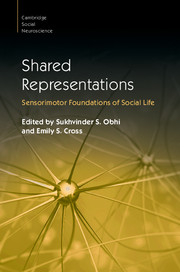Book contents
- Shared Representations
- Cambridge Social Neuroscience
- Shared Representations
- Copyright page
- Contents
- Figures
- Tables
- Boxes
- Contributors
- Preface
- Part I Foundations
- Part II Imitation and Mimicry
- Part III Thinking, Perceiving and Acting with Others
- Part IV Understanding Others
- Part V Learning and Development
- 21 Shared Interoceptive Representations
- 22 Mirror Neuron Formation via Associative Learning
- 23 Disorders of Shared Representations
- 24 Learning by Diffusion
- 25 Observational Motor Learning
- 26 The Impact of Action Expertise on Shared Representations
- Part VI Shared Representations in Applied Contexts
- Index
- Plate Section (PDF Only)
- References
23 - Disorders of Shared Representations
from Part V - Learning and Development
Published online by Cambridge University Press: 27 October 2016
- Shared Representations
- Cambridge Social Neuroscience
- Shared Representations
- Copyright page
- Contents
- Figures
- Tables
- Boxes
- Contributors
- Preface
- Part I Foundations
- Part II Imitation and Mimicry
- Part III Thinking, Perceiving and Acting with Others
- Part IV Understanding Others
- Part V Learning and Development
- 21 Shared Interoceptive Representations
- 22 Mirror Neuron Formation via Associative Learning
- 23 Disorders of Shared Representations
- 24 Learning by Diffusion
- 25 Observational Motor Learning
- 26 The Impact of Action Expertise on Shared Representations
- Part VI Shared Representations in Applied Contexts
- Index
- Plate Section (PDF Only)
- References
Summary
This chapter will begin with a focus on a particular subtopic within the shared representations research domain: imitation. Imitation occurs when the perception of another’s actions causes the activation of the corresponding motor representation in the observer. Thus imitation relates to shared representations in that it concerns the activation of a self-related representation by an other-related representation. In this chapter, I will use examples from the autism spectrum conditions (ASCs) literature to argue that if either the self- or other-related representation is atypical this can result in atypical imitation. In other words, if action observation or action execution mechanisms are atypical, then imitation will be affected. I will conclude this chapter by drawing on research that extends this logic to other sociocognitive domains such as empathy and to conditions such as schizophrenia and alexithymia.
Information
- Type
- Chapter
- Information
- Shared RepresentationsSensorimotor Foundations of Social Life, pp. 480 - 502Publisher: Cambridge University PressPrint publication year: 2016
